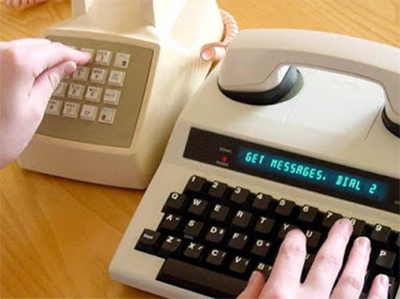I was serving as a pastor for an all-Deaf congregation when the Americans with Disabilities Act (ADA) law was signed July 26, 1990.
For my congregation it meant there would be a free relay service for telecommunications. What an incredible thing! A Deaf person could now call a relay operator using their TTY.

This was a telephone device that allowed a Deaf consumer to type words on a keyboard that would appear onscreen for a person with the same device through the phone line. The relay operator would contact a hearing person for the Deaf consumer, who did not have a TTY, and speak vocally for them the words of the Deaf person’s typed TTY message. Then that same operator would type into the TTY the words that the hearing person was speaking back to the Deaf person.
This was part four of the Americans with Disabilities Act: “Telecommunications.” It meant that Deaf people could then make confidential calls to whomever they wanted without having to go through a hearing volunteer (like me) or a hearing family member.
The other benefits I could see from the ADA included more access to paid sign language interpreters in many places, such as hospitals, doctors’ offices, and state and local museums. Many Deaf people began to have sign language interpreters at their places of work for the first time.
Through the years, progress continues to be made. More buildings are accessible, employers are making needed accommodations in the workplace, and people with all kinds of disabilities are able to live more independently and contribute to society. Employment is still one of the most difficult areas with the national average of full-time employment for people with disabilities at 36%. This is a “work in process” as are all of our journeys toward equality and human rights.
The United Methodist Church affirms the sacred worth of people with disabilities, and in our Social Principles we state that our churches should be accessible and welcoming. We encourage our churches to do Accessibility Audits each year, as well as observe a Disability Awareness Sunday every January.
The federal ADA law exempts churches and religious organizations from compliance. Yet, the law of love requires that we not only follow these principles of inclusion and accommodation, but even go the second mile.
Consider how you would react if a pastor with a disability was appointed to your church. Would you welcome them and their gifts for ministry or focus on their disability and see them as a liability or a burden? Pastors with disabilities often report disappointing responses when they are introduced to their new church for the first time.
Some churches write letters to the bishop asking for a reconsideration, or ask what they did to “deserve” a pastor with a disability. Surely, the beloved community is better than that. Gifts for ministry are not always found in perfect bodies. The truth is: none of us are perfect and yet God uses everything we are and everything we have for God’s purposes. God’s power is made perfect in weakness (II Corinthians 12:9).
excerpt from a Blog post by Bishop Peggy A. Johnson
One of seven apportioned giving opportunities of The United Methodist Church, the Episcopal Fund pays for bishops’ salaries, office and travel expenses, and pension and health-benefit coverage. Please encourage your leaders and congregations to support the Episcopal Fund apportionment at 100 percent.





